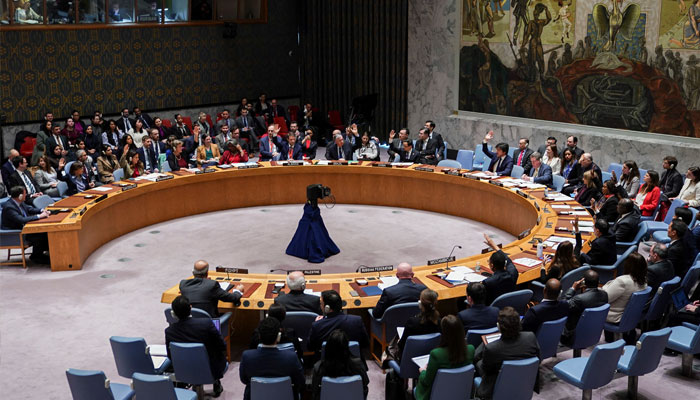Media watchdogs warn UN cybercrime treaty could muzzle the press
Proposed by Russia in 2017, treaty is nearing completion after several years of negotiations
KARACHI: Global media watchdogs and rights groups have expressed their reservations regarding the UN’s Comprehensive International Convention on Cybercrime that is in the process of being finalised. Organisations like the International Press Institute, Committee to Protect Journalists (CPJ), Washington Post Press Freedom Partners and others have openly called the proposed treaty a danger for journalists.
In a post on X (Twitter), IPI has urged the US to “reject a dangerous new global treaty that will give authorities sweeping surveillance powers and hand authoritarians even more tools to target and muzzle the press.” Washington Post Press Freedom Partners also tweeted about the dangers posed by the proposed convention, saying that it could “hand governments around the world dangerous new spying capabilities to track down and punish journalists, and give repressive regimes even more tools for targeting and muzzling the press.”
Initially proposed by Russia in 2017, the now-controversial treaty is nearing completion after several years of contentious negotiations. Despite strong opposition from the US, European countries, and digital rights groups, the UN General Assembly formed a committee in 2019 to draft the treaty. On Monday, UN member states opened a two-week meeting to finalise the treaty. Critics, including Human Rights Watch, argue that the treaty’s broad scope could lead to increased surveillance and repression, targeting journalists, activists, and marginalised groups under the guise of combating cybercrime.
The Freedom Online Coalition, a group of 40 nations including the US, has emphasised the treaty’s potential misuse for domestic and transnational repression and called for more narrowly defined terms and robust safeguards. Tech giants like Microsoft and a coalition of over 100 technology companies have also voiced opposition, warning that the treaty could compromise cybersecurity, facilitate government overreach, and criminalize legitimate cybersecurity research.
The Global Network Initiative (GNI), a global multistakeholder organization focused on freedom of expression and privacy in the technology sector, has also expressed deep concerns about the latest draft of the proposed convention. The GNI has urged member states to reconsider its necessity, given existing frameworks like the Budapest Convention, and said that the proposed draft poses significant risks to privacy, freedom of expression, assembly etc and has provisions that could criminalise legitimate online activities, enable excessive state surveillance, and lack necessary human rights safeguards.
According to critics, the treaty could allow pervasive cross-border surveillance without adequate safeguards. However, Russia has defended the draft, arguing that excessive focus on human rights would hinder international cooperation. For now, the treaty’s outcome remains uncertain.
-
 Timothee Chalamet Admits To Being Inspired By Matthew McConaughey's Performance In 'Interstellar'
Timothee Chalamet Admits To Being Inspired By Matthew McConaughey's Performance In 'Interstellar' -
 'Determined' Savannah Guthrie Plans To Honour Her Mother Nancy With Major Move: 'It's Going To Be Emotional'
'Determined' Savannah Guthrie Plans To Honour Her Mother Nancy With Major Move: 'It's Going To Be Emotional' -
 Train's Pat Monahan Blows The Lid On 'emotional' Tale Attached To Hit Song 'Drops Of Jupiter'
Train's Pat Monahan Blows The Lid On 'emotional' Tale Attached To Hit Song 'Drops Of Jupiter' -
 Kurt Russell Spills The Beans On His Plans For Milestone Birthday This Year: 'Looking Forward To It'
Kurt Russell Spills The Beans On His Plans For Milestone Birthday This Year: 'Looking Forward To It' -
 PayPal Data Breach Exposed Sensitive User Data For Six-month Period; What You Need To Know
PayPal Data Breach Exposed Sensitive User Data For Six-month Period; What You Need To Know -
 Prince William Receives First Heartbreaking News After Andrew Arrest
Prince William Receives First Heartbreaking News After Andrew Arrest -
 11-year-old Allegedly Kills Father Over Confiscated Nintendo Switch
11-year-old Allegedly Kills Father Over Confiscated Nintendo Switch -
 Jacob Elordi Talks About Filming Steamy Scenes With Margot Robbie In 'Wuthering Heights'
Jacob Elordi Talks About Filming Steamy Scenes With Margot Robbie In 'Wuthering Heights' -
 Why Prince Harry Really Wants To Reconcile With King Charles, Prince William, Kate Middleton?
Why Prince Harry Really Wants To Reconcile With King Charles, Prince William, Kate Middleton? -
 'Grief Is Cruel': Kelly Osbourne Offers Glimpse Into Hidden Pain Over Rockstar Father Ozzy Death
'Grief Is Cruel': Kelly Osbourne Offers Glimpse Into Hidden Pain Over Rockstar Father Ozzy Death -
 Timothée Chalamet Reveals Rare Impact Of Not Attending Acting School On Career
Timothée Chalamet Reveals Rare Impact Of Not Attending Acting School On Career -
 Liza Minnelli Gets Candid About Her Struggles With Substance Abuse Post Death Of Mum Judy Garland
Liza Minnelli Gets Candid About Her Struggles With Substance Abuse Post Death Of Mum Judy Garland -
 'Saturday Night Live' Star Will Forte Reveals How He Feels About Returning To The Show After 2010 Exit
'Saturday Night Live' Star Will Forte Reveals How He Feels About Returning To The Show After 2010 Exit -
 Police Officer Arrested Over Alleged Assault Hours After Oath-taking
Police Officer Arrested Over Alleged Assault Hours After Oath-taking -
 Maxwell Seeks To Block Further Release Of Epstein Files, Calls Law ‘unconstitutional’
Maxwell Seeks To Block Further Release Of Epstein Files, Calls Law ‘unconstitutional’ -
 Prince William Issues 'ultimatum' To Queen Camilla As Monarchy Is In 'delicate Phase'
Prince William Issues 'ultimatum' To Queen Camilla As Monarchy Is In 'delicate Phase'




